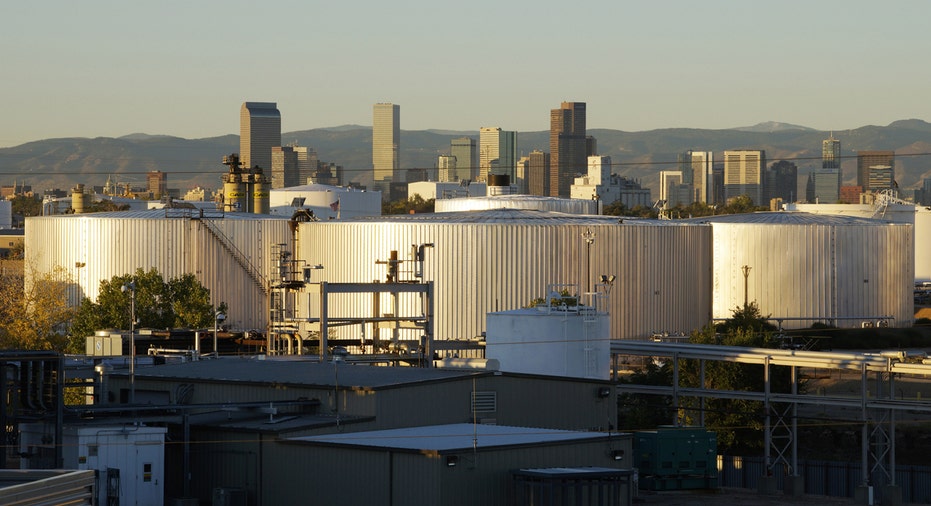Oil Gives Up Gains as Inventories Build

U.S. oil prices eked out a gain Thursday as the U.S. government's weekly oil-inventory report showed another increase in stockpiles of crude oil.
U.S. crude inventories rose by 2.1 million barrels last week to 504.1 million barrels, a new weekly record high, the Energy Information Administration said. In monthly data, which don't line up exactly with weekly data, inventories last exceeded 500 million barrels in 1930.
Light, sweet crude for March delivery settled up 11 cents, or 0.4%, at $30.77 a barrel on the New York Mercantile Exchange. Brent, the global benchmark, slipped 22 cents, or 0.6%, to $34.28 a barrel on ICE Futures Europe. Both benchmarks had been up about 3% ahead of the government data, which was delayed one day due to the Presidents Day holiday.
Oil prices are down more than 70% since a peak in June 2014, driven lower by a mismatch between ample supplies and tepid demand for crude around the globe.
"U.S. and global inventories are nearing maximums, and global production is showing little sign of slowing," said Rob Haworth, senior investment strategist at U.S. Bank Wealth Management, in a note.
Price moves have been especially volatile in recent weeks amid uncertainty about the pace of global demand growth. The U.S. oil benchmark settled up or down by 1% or more for 23 straight sessions until Thursday, the longest such streak since 2009.
U.S. crude stockpiles have climbed since the start of the year as production continued to outpace demand. Inventories fell in the week ended Feb. 5 as imports declined, but imports rose again last week, the EIA data show.
"It's back to business as usual," said Bob Yawger, director of the futures division at Mizuho Securities USA Inc. He predicted that prices "will eventually cave under the weight of these storage numbers."
Supplies of gasoline and distillates, including heating oil and diesel fuel, also rose.
Gasoline futures fell 3.1 cents, or 3.1% to 97.24 cents a gallon. Diesel futures fell 0.87 cent, or 0.8%, to $1.0792 a gallon.
Production of crude oil declined by 51,000 barrels a day in the week to 9.1 million barrels a day, which could support the market. Investors have watched closely for signs that U.S. crude production is set to decline more steeply amid low prices. Output has remained more resilient than many expected due to cost cuts and improved efficiency.
Expectations that major producers could agree to limit global production helped support prices earlier Thursday.
Russia, Saudi Arabia, Qatar and Venezuela earlier this week said they would cap output at current levels if Iran and Iraq also followed suit. Both Iraq and Iran have declined to say they would curb production growth.
"The deal has to involve everyone and it is contingent on an agreement to do so by all parties," said Michael Poulsen, oil analyst at Global Risk Management. "As you might expect, hurdles lie ahead."
Even still, analysts say, the talks have been bullish for oil prices because they increase the likelihood that the current oversupply of crude will shrink more quickly than previously expected.
Producers are likely to keep talking about output cuts in hopes of boosting prices further, said Jim Ritterbusch, president of energy-advisory firm Ritterbusch & Associates, in a note.
"Although most producers are well aware of the fact that actualization of any output reductions will prove minimal, we expect that various discussions will continue given the magnitude of the $5 crude price spike during the past week," he said.
The oil-price rout has hit the bottom lines of energy companies, which are coping by reducing investments and laying off workers. Even a deep-pocketed country like Saudi Arabia that depends largely on oil revenue ran a record deficit of nearly $98 billion last year, about 15% of gross domestic product.
On Wednesday, Standard & Poor's cut Saudi Arabia's credit rating to A- from A+, citing the "marked and lasting impact" of falling oil prices on the economy.
Jenny W. Hsu contributed to this article.
By Nicole Friedman and Georgi Kantchev



















